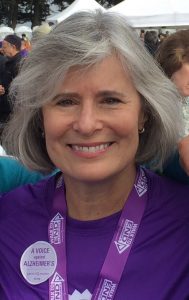
Join Our Community of Monthly Supporters to Fight Alzheimer’s Disease All Year Long
Join Our Community of Monthly Supporters to Fight Alzheimer’s Disease All Year Long
Help provide care and support for millions affected by Alzheimer’s and advance research to bring us closer to a cure all year long with a monthly gift.
Give Monthly“Absolutely!” I replied, “What do you need me to do and when?”
“Can you possibly get something posted in the next 30 minutes?” Ruth said. “I’ll send you some ideas and a link to the Open Debate Coalition website.”
Standing in line, juggling my luggage, I managed to type this question into my mobile phone, editing on the fly to comply with the 80-character limit: What’s your plan to tackle the large public health crisis: Alzheimer’s disease? As a supporting statement, which couldn’t exceed 200 characters, I wrote: An estimated 5.4 million Americans are living with Alzheimer’s disease. Our nation’s most expensive disease, it is the leading cause of death in US without any known prevention, treatments or cure.
I pressed send, confirmed the posting and tweeted a link just before boarding. By the time my plane landed, we were at 1,500 votes. I emailed our Chapter Board and staff, asking them to vote and activate their networks. And then my focus turned to spending three wonderful days in New York.
But early Sunday morning, October 2, I received an email from the Open Debate Coalition, advising that our question was now in the top 50 and asking:
- Would I be willing to talk to a reporter about the Open Debate process, the content of my question, and my personal connection to it?
- Would I send a simple video, shot from my phone, of me asking the question for “the candidates -- and America! -- to see the actual people who asked these questions”?
- If the opportunity presented itself would I be willing to attend in person?
In the meantime, the Alzheimer’s Association legislative advocacy team and Alzheimer’s Impact Movement (AIM) staff started engaging social media to mobilize our advocates across the country. Our question began rising in the rankings: number 33 out of 9,000 by October 4 in the morning, number 30 by midday. The e-News alert went out on October 5 and we received more than 500 votes in less than 20 minutes. Our question jumped to number 23, and by late afternoon had reached number 15, now of more than 10,000 questions. When we awoke on Thursday, October 6, our question was in the top 10, and had climbed to number nine out of 12,000 questions by the end of the day.
It was a giddy feeling — to think we’d have the chance to reach more than 80 million people about the need to end Alzheimer’s disease! My mobile phone was at my side every moment, just to be sure I didn’t miss a call from the Coalition.
By Friday morning, with the debate less than three days away, our question had slipped a bit in the rankings but is still growing in support. Organizers have said the Top 30 will be considered and with some questions on duplicate topics, I’m still feeling optimistic about our chances. And I’m not done growing support for our question as we head into the final days of voting.
On Sunday night, I’ll join tens of millions of Americans watching the debate. Of course I’m hoping our question will be included, or at least that the candidates will mention Alzheimer’s disease on their own initiative, now that so many people have shown how much they care about this issue. But regardless of the outcome, it’s been exciting to see our network of advocates mobilize around this special opportunity to raise Alzheimer’s awareness. Many thanks to everyone who voted for our question and spread the word. It gives me even more confidence that together we will end Alzheimer’s!
To vote for Karen’s question, please visit: bit.ly/Ask4ALZ
About the Author: Karen Stevenson is the board chair of the Northern California & Northern Nevada chapter of the Alzheimer's Association.
